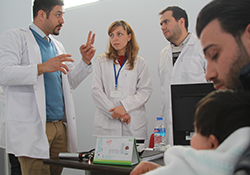Update on WHO’s Syrian refugee response in Turkey

WHO/Laura Sheahen
Since October 2013, the WHO field presence in Gaziantep, Turkey has supported the Ministry of Health in addressing the health needs of Syrian refugees in the country. There are currently 2.8 million refugees in Turkey, and 85 Migrant Health Centres that provide health services to them. The following update gives an overview of key activities in January 2017.
Primary care
Syrian doctors and nurses who have taken WHO-supported adaptation courses started their practical training in several of Turkey’s Migrant Health Training Centres. The innovative programme helps Syrian medical staff integrate into the Turkish health care system and provide care for their fellow refugees. Turkish doctors mentor their Syrian colleagues. When Syrian staff successfully complete their hands-on training, they are eligible for employment in Migrant Health Centres. Since autumn of 2016, a total of 850 Syrian health staff have been trained.
Vaccination
WHO is supporting the Ministry of Health to screen Syrian refugee children in Turkey. Teams assess children’s living situation and their vaccination status for measles/rubella, the pentavalent vaccine and hepatitis B. Field work has started, with nearly 500 field teams visiting households or places of work. The Ministry of Health began a vaccination campaign on 15 February to immunize children whose records are missing or who have not been vaccinated.
Mental health
WHO is preparing to train 375 Turkish family physicians and 150 registered Syrian doctors in mhGAP, a mental health programme. WHO is advocating that the Ministry of Health integrate mental health support into primary health care services. This would enable trained doctors to provide mental health services to refugees and host communities.
Noncommunicable diseases
WHO provides continuing medical education to Turkish and Syrian doctors in diagnosing and treating diabetes, asthma, hypertension, pulmonary diseases and more.
Funding
Out of a total of US$ 11.8 million needed for its lifesaving work to help Syrian refugees in Turkey in 2017, WHO has received US$ 800 000. WHO programmes in Turkey are funded by European Civil Protection and Humanitarian Aid Operations (ECHO), the United States Bureau of Population, Refugees, and Migration (BPRM), and the governments of China, Kuwait and Norway.



